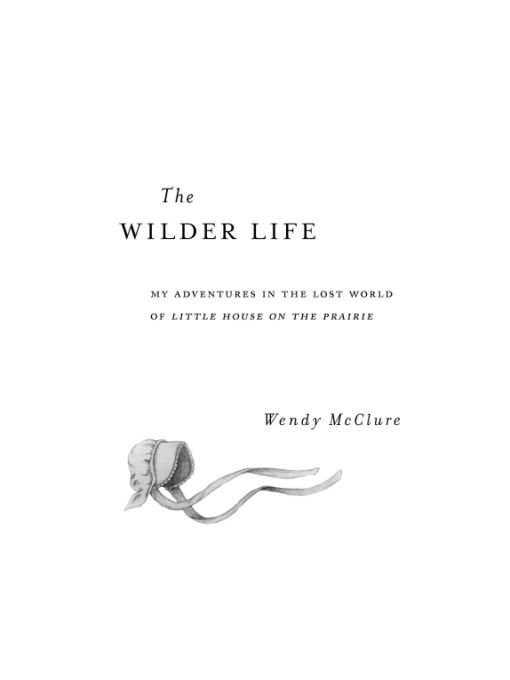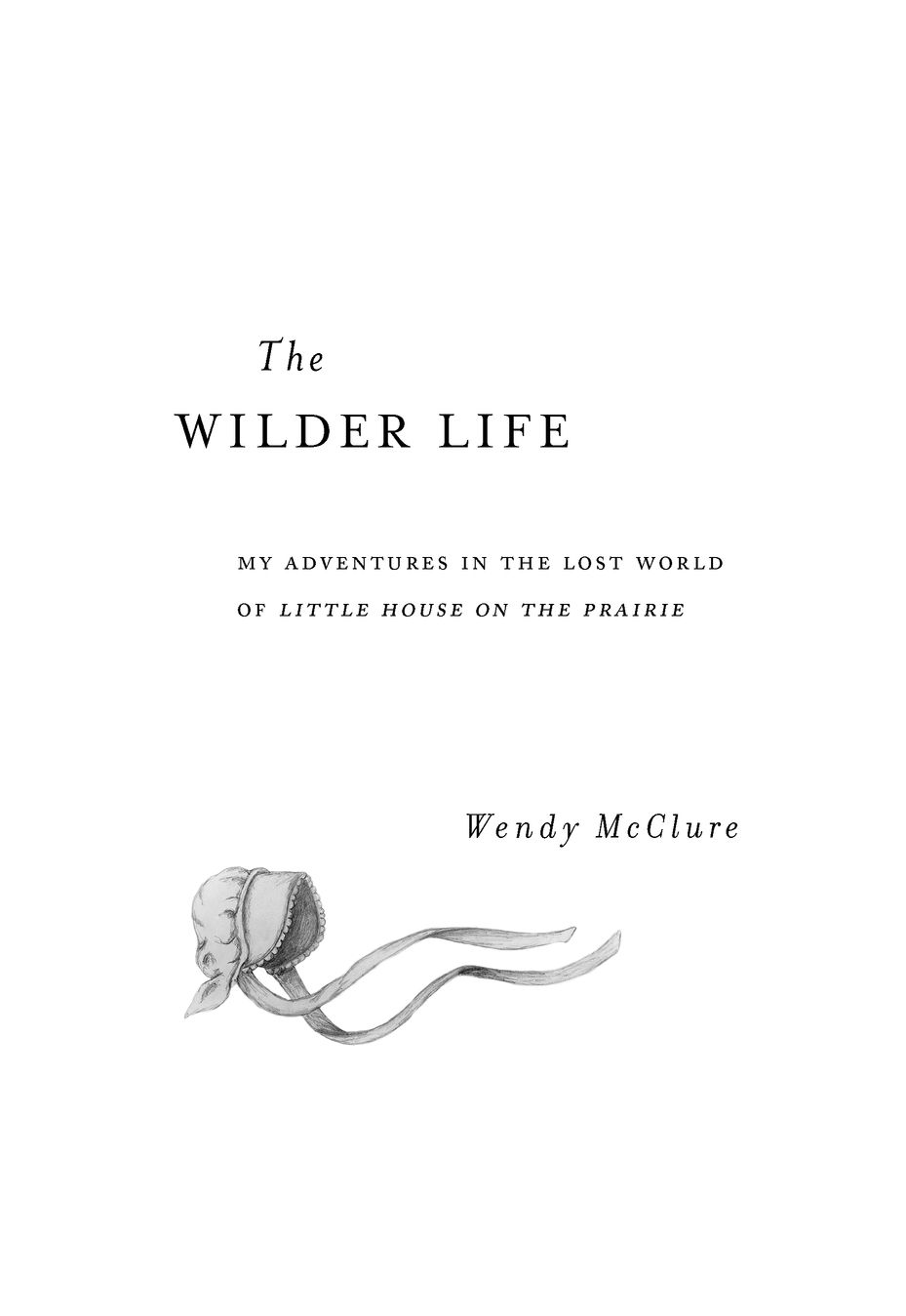Authors: Wendy McClure
The Wilder Life


Table of Contents
Â
Â
ALSO BY WENDY MC CLURE
I'm Not the New Me
Â
The Amazing Mackerel Pudding Plan
RIVERHEAD BOOKS
Â
a member of Penguin Group (USA) Inc.
Â
New York 2011

RIVERHEAD BOOKS
Published by the Penguin Group
Penguin Group (USA) Inc., 375 Hudson Street, New York, New York 10014, USA â¢
Penguin Group (Canada), 90 Eglinton Avenue East, Suite 700, Toronto, Ontario M4P 2Y3, Canada (a division of Pearson Penguin Canada Inc.) ⢠Penguin Books Ltd, 80 Strand, London WC2R 0RL, England ⢠Penguin Ireland, 25 St Stephen's Green, Dublin 2, Ireland (a division of Penguin Books Ltd) ⢠Penguin Group (Australia), 250 Camberwell Road, Camberwell, Victoria 3124, Australia (a division of Pearson Australia Group Pty Ltd) ⢠Penguin Books India Pvt Ltd, 11 Community Centre, Panchsheel Park, New Delhiâ110 017, India ⢠Penguin Group (NZ), 67 Apollo Drive, Rosedale, North Shore 0632, New Zealand (a division of Pearson New Zealand Ltd) â¢
Penguin Books (South Africa) (Pty) Ltd, 24 Sturdee Avenue, Rosebank, Johannesburg 2196, South Africa
Penguin Books Ltd, Registered Offices: 80 Strand, London WC2R 0RL, England
Â
Copyright © 2011 by Wendy McClureAll rights reserved. No part of this book may be reproduced, scanned, or distributed in any printed or electronic form without permission. Please do not participate in or encourage piracy of copyrighted materials in violation of the author's rights. Purchase only authorized editions. Published simultaneously in Canada
Â
Library of Congress Cataloging-in-Publication Data
McClure, Wendy.
The Wilder life : my adventures in the lost world of Little house on the prairie / Wendy McClure. p. cm.
Includes bibliographical references.
eISBN : 978-1-101-48653-5
1. Wilder, Laura Ingalls, 1867â1957âAppreciation. 2. Wilder, Laura Ingalls, 1867â1957. Little house on the prairie. 3. Frontier and pioneer life in literature. I. Title.
PS3545.I342Z
813'.52âdc22
Â
Â
Book design and illustrations by Meighan Cavanaugh
Â
The names and identities of some individuals in this book have been changed to protect their privacy. Laura Ingalls Wilder changed a few names, too, you know.
While the author has made every effort to provide accurate telephone numbers and Internet addresses at the time of publication, neither the publisher nor the author assumes any responsibility for errors, or for changes that occur after publication. Further, the publisher does not have any control over and does not assume any responsibility for author or third-party websites or their content.
Â
Penguin is committed to publishing works of quality and integrity.
In that spirit, we are proud to offer this book to our readers;
however, the story, the experiences, and the words
are the author's alone.
In that spirit, we are proud to offer this book to our readers;
however, the story, the experiences, and the words
are the author's alone.
For Dad, with love.
Â
And for Chris, who read the books.
1.
Our Past Life
I WAS BORN in 1867 in a log cabin in Wisconsin and maybe you were, too. We lived with our family in the Big Woods, and then we all traveled in a covered wagon to Indian Territory, where Pa built us another house, out on high land where the prairie grasses swayed. Right?
We remember the strangest things: the way rabbits and wild hens and snakes raced past the cabin to escape a prairie fire, or else how it felt when the head of a needle slipped through a hole in the thimble and stuck us hard, and we wanted to yell, but we didn't. We moved on to Minnesota, then South Dakota. I swear to God it's true: we were a girl named Laura, who lived and grew up and grew old and passed on, and then she became a part of us somehow. She existed fully formed in our heads, her memories swimming around in our brains with our own.
Or that's how it felt to me at least. That's how it still feels sometimes, if I really think about it. I mean I don't believe in reincarnation, and obviously Laura Ingalls Wilder didn't either, not with her respectable Protestant singing-off-key-in-wooden-churches upbringing. It's just how reading the Little House books was for me as a kid. They gave me the uncanny sense that I'd experienced everything she had, that I had nearly drowned in the same flooded creek, endured the grasshopper plague of 1875, and lived through the Hard Winter. It's a classic childhood delusion, I know, and in my typically dippy way I tended to believe that the fantasy was mine alone, that this magical past-life business was between Laura and me and no one else. Surely
I
was the only one who had this profound mind-meld with her that allowed me to feel her phantom pigtails tugging at my scalp; I had to be the only one who was into the books that much.
I
was the only one who had this profound mind-meld with her that allowed me to feel her phantom pigtails tugging at my scalp; I had to be the only one who was into the books that much.
This was despite the fact that I was just one of the millions of kids who discovered Wilder's books in the 1970s and '80s, not too long after the entire nine-book series was released in paperback in 1971, and around the same time the TV show
Little House on the Prairie
aired on NBC. Girls in earlier eras would have read the books in hardcover editions, perhaps as gifts from nice relatives who themselves loved the books as children.
Little House on the Prairie
aired on NBC. Girls in earlier eras would have read the books in hardcover editions, perhaps as gifts from nice relatives who themselves loved the books as children.
(And let's be honest here: if you didn't already know and love the Little House books, they would look and sound an awful lot like something your grandmother would foist upon you as a present, what with their historically edifying qualities and family valuesâbasically, the literary equivalent of long underwear. In fact, I'm surprised that
my
grandmother didn't give them to me, though had she done so, they might have gone unread, along with the etiquette guide and the thick, small-print, illustration-free book about the Amish. Thank you, Grandma. Sorry, Grandma.)
my
grandmother didn't give them to me, though had she done so, they might have gone unread, along with the etiquette guide and the thick, small-print, illustration-free book about the Amish. Thank you, Grandma. Sorry, Grandma.)
Readers of my generation, though, could buy the Little House books cheap through Scholastic Book Clubs, and a great many more found their way to them after watching the TV show. And we were maybe the first generation of readers to be completely out of recollection range for the era these books recordedâwe were born so late in the century that even our grandparents had only secondhand knowledge of covered wagons and dresses with bustles. The books were no longer really about anyone's “good old days” anymoreânobody
I
knew, at leastâand as a result the world they described, the woods and prairies and big sloughs and little towns, seemed to me almost as self-contained and mystical as Narnia or Oz.
I
knew, at leastâand as a result the world they described, the woods and prairies and big sloughs and little towns, seemed to me almost as self-contained and mystical as Narnia or Oz.
Except even better, because unlike those wholly fictional realms, the “Laura World,” as I'd come to think of it, was a little more permeable. It shared space with the actual past, so things from it could make their way into my world, where I would look for them everywhere. No doubt it helped that countless family restaurants and steak emporiums of my 1970s suburban childhood went for rustic, antique-strewn decorating themes, with knickknack shelves full of tin cups and assorted old-timey crap. It didn't take much more than, say, the sight of a dusty glass oil lamp on the wall above a booth at a suburban Bonanza to make me feel like I was communing with Laura while I ate my cottage fries. Which I preferred to think of as “pan-fried potatoes.”
Not like I was a dorky kid or anything.

Since I edit children's books for a living, I get asked a lot about my favorite books as a kid. When I tell people I loved the Little House books, I know it's a perfectly respectable answer, the sort of thing folks expect me to say. Then sometimes they go on and ask me whether I also loved various other Important Children's Books, like
Where the Wild Things Are
and
The Little Prince
and
The House at Pooh Corner
, and I'll do my best for a while, trying to play along, and then at some point I have to hem and haw and shrug because, well, you know what I really liked? I liked books that had pictures of toast in them.
Where the Wild Things Are
and
The Little Prince
and
The House at Pooh Corner
, and I'll do my best for a while, trying to play along, and then at some point I have to hem and haw and shrug because, well, you know what I really liked? I liked books that had pictures of toast in them.

Well, not
just
toast, but, you know, cups and ladles and baskets and hats, lovingly rendered, all in their places in a room or even just in little vignettes, but at any rate,
things,
in all their thinginess. I had, and loved, a battered 1960s-era “pictionary” with wagons and hot dogs and butter dishes floating in plotless arrangements on the page. I pored over the page spreads in Richard Scarry's Book of Something-or-Other, looking at all the little rooms whose contents were meticulously catalogued and the dressed-up raccoons and pigs and squirrels who sat in them, drinking “coffee” and listening to the “radio” and eating, yes, “toast.”
just
toast, but, you know, cups and ladles and baskets and hats, lovingly rendered, all in their places in a room or even just in little vignettes, but at any rate,
things,
in all their thinginess. I had, and loved, a battered 1960s-era “pictionary” with wagons and hot dogs and butter dishes floating in plotless arrangements on the page. I pored over the page spreads in Richard Scarry's Book of Something-or-Other, looking at all the little rooms whose contents were meticulously catalogued and the dressed-up raccoons and pigs and squirrels who sat in them, drinking “coffee” and listening to the “radio” and eating, yes, “toast.”
Other books
What Planet Am I On? by Shaun Ryder
See Me by Higgins, Wendy
The Lover's Surrender (No Exceptions) by J.C. Reed
For Want of a Memory by Robert Lubrican
Hitler's Terror Weapons by Brooks, Geoffrey
Ghost Sword by Jonathan Moeller
Best She Ever Had (9781617733963) by Ellis, Shelly
Dracul's Revenge 02: Anarchy in Blood by Carol Lynne, T. A. Chase
The Shattered Rose by Jo Beverley
Unbridled Temptation by Saint James, Elle
